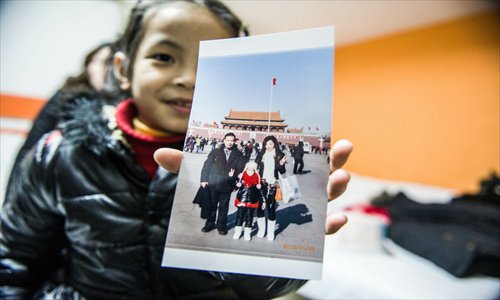Weibo NGO aids trafficked girl, 7

A 7-year-old girl who was sold as a baby and then abandoned, arrived in Beijing Friday for medical treatment after anti-kidnapping activists reported her case to the police, highlighting the continuing problems China faces in dealing with child trafficking.
Zhong Tingting, whose hometown remains unknown, was allegedly sold to Xie Suitian and wife Chen Ailing in Ruian, Zhejiang Province seven days after her birth. The pair gave the child up to another couple in the province's Pingyang county around two months later.
Farmer Zhong Zhengchi, 55, who has since brought up Tingting with his wife, has traveled to Beijing with his adult daughter and Tingting. The family are staying in a hostel near Beijing Children's Hospital in Xicheng district, while they wait for her to be evaluated by doctors in the coming days for an as-yet undiagnosed disease of the nervous system. The expenses have been paid by Beijing-based iKang Guobin Health Management Company.
Sitting in the plain basement room, Zhong told the Global Times how Tingting came to them.
"It was a late April night in 2006. The family who bought her woke us up by knocking repeatedly. My wife had brought up one of their relatives, so they thought we are good at raising children," said Zhong, adding he was not told why Xie and Chen did not want to keep the girl.
At first the couple paid Zhong 10,000 yuan ($1,605) but when it was discovered Tingting was suffering from a disease of the nervous system and malnutrition, they told Zhong to abandon the girl.
"They told me to throw the girl wherever I like, trash pile or road crossing as they didn't care. But we just couldn't do it," said Zhong.
Xie gave Zhong an "adoption contract" but as he cannot read, he did not realize Xie had written they would no longer take responsibility for her or pay more money.
As she was not born locally, Tingting has no hukou (household registration) and therefore has no access to education and healthcare services, and the girl's medical condition continued to worry them.
The local school refused to enroll her, and she was bullied by other children for being an orphan, which made her afraid to attend school.
Zhong and his wife also grow anxious as they get older as their son and daughter refuse to raise Tingting.
"We live a poor life and are getting older, so how will Tingting live when both of us have gone?" he said.
Local residents who sympathized with Tingting's story contacted the Weibo Anti-Kidnapping Foundation, an NGO formed on the Sina microblog. A volunteer from the NGO, who asked to be named as "Zaizai" said after he investigated her situation, he reported the case to police.
"Local police promised they would sample Tingting's blood and put her in the national anti-kidnapping DNA database to find her hometown, and said they would help to solve her hukou and education issue," said Zaizai.
Police are still investigating whether Tingting was sold by her birth parents or was kidnapped.
Li Qin, from Weibo Anti-Kidnapping Foundation, said that since it was founded in April 2012, it has cooperated with police to rescue six children and arrest 12 criminals, but a major difficulty is making the public understand, especially in rural areas, that selling children is a crime which is as bad as kidnapping.
"These people have no idea that buying and selling children is also a severe crime," said Li.
Li said efforts should also be made to trace the parents after a kidnapped child is identified.
Accurate figures on the numbers of kidnapped children are hard to ascertain, but Charles Custer, an American independent documentary maker, who made Living With Dead Hearts, a documentary which focuses on kidnapped children, estimates that around 70,000 children are kidnapped every year in China.
A report from people.com.cn in December 2012 said that from September 2012 to December, nine child trafficking rings were busted, with 355 suspects arrested and 89 children rescued.